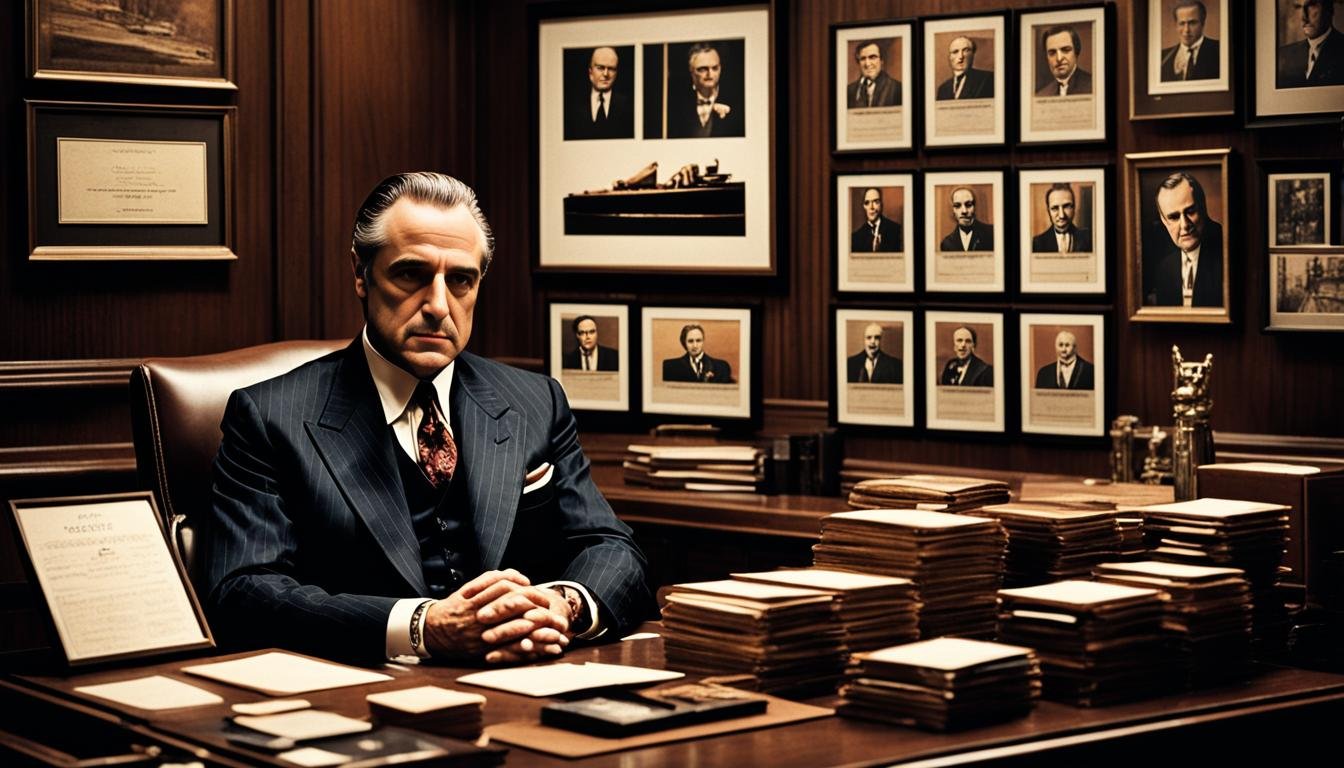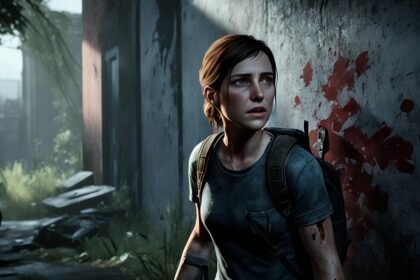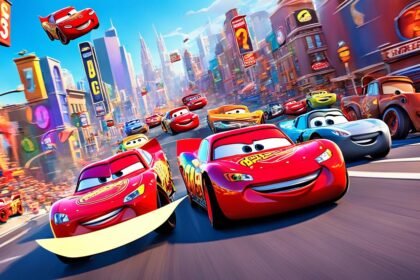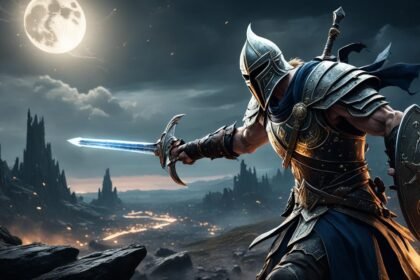“The Godfather” came out in 1972, directed by Francis Ford Coppola. It quickly became a movie classic. The story dives into the mafia world, showing us the Italian-American culture. The acting of Marlon Brando as Vito Corleone and Al Pacino as Michael has been unforgettable.
The movie explores family bonds and what it means to be loyal. It talks about power and the struggles within a crime family. Since its release, “The Godfather” has influenced many films and aspects of culture.
Key Takeaways:
- The Godfather, directed by Francis Ford Coppola, is a cinematic masterpiece that delves into the world of organized crime.
- Marlon Brando’s portrayal of Vito Corleone and Al Pacino’s performance as Michael Corleone are iconic.
- The film highlights Italian-American culture and the complex dynamics of a crime family.
- The Godfather’s influence on mob movies and popular culture is enduring.
- The film’s exploration of power, loyalty, and morality resonates across eras.
A Cultural Touchstone: The Godfather’s Portrayal of Mafia Characters
“The Godfather” debuted in New York on March 15, 1972. It was a turning point, bringing mafia life to the big screen like never before. Even as it nears its 50th anniversary, its impact on culture is clear.
The story of American gangsters thrilled audiences for decades before “The Godfather” came along. But, this film changed the game by making mafia families surprisingly relatable. It showed the Corleones as more than just bad guys, revealing their deep, internal struggles.
Marlon Brando, Al Pacino, and others became unforgettable through their performances. They made the complex, human stories of the movie leap from the screen, capturing audiences’ hearts.
Behind the camera, Gordon Willis created a dark, moody look for the film. This approach, using bold shadows, added a layer of rawness to the mafia world. It was something audiences had never really seen in color before.
Who can forget the intense scene in the restaurant? The tension keeps climbing until Michael makes his fateful move. This moment, with its carefully planned details, draws you deep into the Corleone family’s dangerous world.
“The Godfather” is more than just a movie; it’s a milestone that changed how we see crime stories. With its deep characters and rich storytelling, it influenced many films and shows that came after. Even top directors like Martin Scorsese and Quentin Tarantino have been inspired by its brilliance.
| The Godfather’s Impact on Portrayal of Mafia Characters | Key Points |
|---|---|
| Revolutionized the portrayal of crime families | Nuanced perspective, humanizing characters |
| Challenged stereotypes | Complex dynamics within organized crime |
| Iconic performances by Marlon Brando, Al Pacino, Sterling Hayden, and Richard Conte | Contributed to the film’s status as a classic |
| Director of photography Gordon Willis | Defined the visual style of the movie |
| Restaurant scene | Constant building of tension and attention to period details |
| Inspired subsequent movies, TV shows, and popular culture | Influential directors like Martin Scorsese and Quentin Tarantino |
The Intersection of Power and Family in The Godfather
In “The Godfather,” power and family mix in a captivating story. Francis Ford Coppola directs the film. It shows how the Corleone family and power affect each other deeply.
Vito Corleone leads the family with a strong hand. Marlon Brando plays Vito, showing how he balances power with love for his family. He leads by protecting them, knowing the world’s power games.
Vito’s son, Michael Corleone, finds himself pulled into the family’s business. Al Pacino portrays Michael’s journey to power and the sacrifices he makes. His story highlights power’s dark side and the difficult choices it brings.
“The Godfather” uses flashbacks to show similarities between Vito and Michael. We see the turning points that led them to their criminal lives. These flashbacks show the struggle between the good and bad sides of power.
The Struggle for Power and the Consequences Faced by the Characters
The movie focuses on the Corleone family’s climb in the underworld. They face tough choices and betrayals on their path to power. This world tests their morals and family loyalty.
Vito’s journey from Sicily to America runs parallel with Michael’s efforts to hold the family together. These stories show how different the two men are. Vito’s past tests his leadership, while Michael works to honor the family name.
“The Godfather” looks deeply into the Corleone family’s power struggles. It makes us think about loyalty’s limits and the heavy price of holding power.
“The Godfather delves into the intricate relationship between power and family, highlighting the consequences faced by those who seek to maintain control.”
| Significant Characters | Biblical Figures | Actions Taken | Prophecies Fulfilled |
|---|---|---|---|
| Michael Corleone | David | Executions of Joab and Shimei | Expulsion of Eli’s family from the house of God |
| Carlo | Adonijah | Exile of Abiathar | |
| Tessio | Solomon | Execution of Adonijah | |
| Virgil Solozzo | Joab | ||
| Tattaglia | Shimei | ||
| Cuneo | |||
| Stacci | |||
| Barzini |
The Godfather Part II is considered a step above the original. It elevates the Don Vito and Michael Corleone characters even further. Despite the first film’s perfection, the sequel enhances its content greatly.
“The Godfather” remains an iconic examination of power, family, and authority. It shows the hard balance between family ties and the pull of power’s temptations. Decades after its first screening, the film remains incredibly influential.
The Cultural Significance of The Godfather
“The Godfather” movie debuted in New York City on March 24, 1972. It’s very important, especially to those of Italian-American background. The film tells a beautiful story of the immigrant journey and the fight to fit in, capturing themes of family, loyalty, and the American Dream. It speaks to a wide audience, showing the struggles around maintaining cultural roots while seeking acceptance in a new home.
Francis Ford Coppola directed “The Godfather”. It was a groundbreaking film, breaking stereotypes about Italian-Americans and highlighting their culture authentically. It focused on the powerful family relationships and values at the heart of these communities. The movie’s messages of loyalty, honor, and the immigrant experience really connected with viewers.
In the 1970s, known as the “Last Golden Age of American Film,” “The Godfather” rose as a true masterpiece. It highlighted the brilliance of fresh directors like Francis Ford Coppola and others. They brought new, bold approaches to storytelling, moving away from the old Hollywood ways. “The Godfather” was a key player in this shift, setting the stage for innovative filmmaking.
Today, we can enjoy “The Godfather” in its full glory thanks to advanced technology. Films are restored to their former beauty, keeping their original spirit alive. With 4K Ultra HD, audiences can now dive into the intricate world crafted by the talented cinematographer, Gordon Willis, known as the “Prince of Darkness.”
Even though “The Godfather” shows mafia life, it’s not a fair picture of most Italian-Americans. Just a tiny fraction of them, 0.00782 percent, were tied to crime, as per the FBI. Yet, many people still wrongly think that Italian-Americans are linked to organized crime. The trilogy helped break these false beliefs, showing Italians in a more authentic, full way.
Don Corleone, played by Marlon Brando, is one of the most remembered characters in film history. His role highlighted the tough yet caring nature of the head of the Corleone family. At a time when trust in society was low due to events like the Vietnam War and Watergate, “The Godfather” offered a glimpse into a more stable, traditional past.
“The Godfather” movie not only brought the term “the godfather” into common language to describe mob bosses. Real criminals started using it, showing the film’s deep cultural impact. This influence makes it more than just a movie; it’s a piece of our cultural heritage.
Overall, “The Godfather” is more than a film. It’s a story that speaks to the challenges of starting anew, the meaning of family, and the dream of a better life. Its impact on culture and filmmaking is lasting, making it a work of art that stands the test of time.
| Highest-grossing film of 1972 | Highest-grossing film overall for a period of time | Acclaimed films by Francis Ford Coppola | Rise of young filmmakers in the 1970s |
|---|---|---|---|
| The Godfather achieved immense commercial success, becoming the highest-grossing film of 1972. | For a period of time, it also held the title of the highest-grossing film overall, cementing its place in cinematic history. | Directed by Francis Ford Coppola, The Godfather is part of his illustrious filmography, which includes other acclaimed works such as The Godfather Part II, The Conversation, and Apocalypse Now. | The film industry in the 1970s witnessed the rise of visionary young filmmakers like Francis Ford Coppola, Martin Scorsese, and Steven Spielberg. These directors reshaped the landscape of American cinema and ushered in the era known as the “Last Golden Age of American Film.” |
Critical Acclaim: The Godfather’s Reception and Awards
When The Godfather first came out, everyone loved it. Critics showered it with praise, calling it a work of art. They loved the deep stories, the great acting, and the intense plots. Even today, people see it as a standard for movies.
Marlon Brando won a big award for his role in the movie. He got the Best Actor Oscar, making him known as one of the all-time best actors. The movie itself was named Best Picture at the Oscars. It also won for Best Screenplay, showing how much it touched people in the industry.
Not only did The Godfather win over critics, but it also made a lot of money. In 1972, it became the movie that made the most money that year. People flocked to theaters to see the thrilling story and memorable characters.
This success led to two more movies: The Godfather Part II in 1974 and The Godfather Part III in 1990. Both were hits as well, making the Godfather series a true cultural icon.
“The Godfather set the standard for what a crime drama should be. Its powerful storytelling and compelling performances continue to resonate with audiences of all generations.”
The American Film Institute says The Godfather is the second best movie in U.S. history, right after Citizen Kane. This shows just how much people still love and respect the movie.
The Godfather has left its mark on our culture. It inspired games and is still loved by fans, who buy its merchandise. Being chosen for the National Film Registry also proves its lasting worth as a piece of art.
The Godfather’s Lasting Impact on Cinema
“The Godfather,” released in 1972, changed the gangster movie genre forever. It used new ways to tell stories, like long takes and tracking shots. These techniques drew viewers in, making them feel part of the story. The film is known for its grand plot and detailed characters.
Gordon Willis shaped the movie’s look as the director of photography. He used dark shades and shadows to give the film an unprecedented visual style. This made “The Godfather” stand out from other color films of the time.
The movie includes references to older gangster films. These nods show that it respects the history of its genre. They add richness to the story, helping audiences understand the film’s context and deeper meanings.
The “The Godfather’s” famous restaurant scene is a masterpiece of tension-building. It holds the audience’s attention with every moment. The moment Michael shoots a policeman is unforgettable, leaving a strong impression on viewers.
Detailed settings and realistic acting help viewers experience the film deeply. They transport you back in time, making you feel like you’re living in the movie. This connection boosts the emotional impact of the story.
Many people, not just Francis Ford Coppola and Gordon Willis, made “The Godfather” great. A whole team of artists, directors, and designers worked together. They produced a movie that is both visually stunning and captivating.
“The Godfather” is still influential in movies today. It introduced new ideas and themes that are now common in film. Its fame and cultural importance show its lasting power in the world of cinema.
The Restoration and Return of The Godfather to Theaters
The Godfather celebrates 50 years with a grand return to theaters. It received a careful restoration. Now, its cinematic beauty shines on the big screen again.
The restoration involved preserving the film’s look. Director Francis Ford Coppola led a three-year effort on all three movies. Each frame was restored to its original beauty.
They checked over 300 cups of film to find the best material. They then spent 4,000 hours getting rid of damages. Another 1,000 hours were for perfecting the colors.
This hard work brought back the full impact of The Godfather. Now, viewers dive into the Corleone family’s world. The movie’s famous scenes are sharper and clearer.
The new The Godfather films will release on March 22, 2022, in 4K Ultra HD. There will also be a new trailer to show off the careful restoration and the film’s lasting impact.
Nothing beats seeing The Godfather in a theater. This chance offers a full dive into this iconic movie. It’s a way to truly understand its importance and greatness.
The film will be in select theaters. Some will even show it with Dolby Vision at Dolby Cinema in AMC Theatres. This is a big deal for fans and anyone who loves great movies.
The Godfather coming back is a major event. It’s timeless and still draws fans. This re-release is a must-see, whether you know the movie well or are just starting.
The Relevance of The Godfather in Today’s Society
Even though The Godfather was released nearly 50 years ago, it’s still very relevant today. The movie shows how power, corruption, and social dynamics affect people. It asks deep questions about family, sacrifices, and the results of our choices.
The Godfather is all about power and what it brings with it. It shows how someone in charge often faces tough decisions. You see themes of loyalty, betrayal, and looking after oneself throughout the movie.
The Godfather also makes us think about what’s right and wrong. It shows how power can change people and lead to tough moral choices. The movie is famous for highlighting the dangers of too much power.
This film keeps on being important because it makes us talk about big issues in our society. It gets us thinking about power, how we should act, and what it means to be moral. These themes are still being talked about because The Godfather is so powerful.
A major point of The Godfather is the dark world of crime and power. It tells us how people sometimes do bad things to get what they want. The movie warns us about the ugly side of society and challenges us to think about our own morals.
“I’ll make him an offer he can’t refuse.”
The Godfather’s Legacy in Popular Culture
The Godfather has influenced many other forms of art, like TV shows and books. Hits like The Sopranos, Breaking Bad, and Succession borrow ideas from it. They show complex characters dealing with power just like in The Godfather.
The movie also helped the careers of its actors, including Marlon Brando, Al Pacino, and Diane Keaton. Their work in The Godfather made them well-respected in the film world. It showed everyone just how talented they were.
The Godfather: An Enduring Piece of Cinematic History
The Godfather is often called one of the best films ever made. It won many Oscars and continues to influence new filmmakers. Its impact on art and culture is huge, proving its lasting power.
Be part of The Godfather‘s amazing return to the big screen in 4K. Join us from March 22, 2022, to see the film in stunning detail. Its original look and themes have been carefully preserved, continuing its legacy.
Let’s celebrate The Godfather and its timeless message. It makes us think about society, power, and moral choices. The film’s impact is felt in many ways, continuing to be a major part of cinema history.
| Year | Awards |
|---|---|
| 1972 | Best Picture, Best Actor (Marlon Brando) |
| 1974 | Best Picture (The Godfather: Part II) |
The Godfather’s Cultural and Historical Examination of the 1970s
“The Godfather” is a key film that reflects the 1970s well, a critical time in American cinema. This era is often called the “Last Golden Age of American Film.” It was marked by movies that broke new ground, focusing on social and political topics. These films challenged usual ways of telling stories. They arrived during a time when America was facing the Vietnam War and the Watergate scandal.
Americans felt disillusioned and cynical then. “The Godfather” skillfully showed this mood. The movie explores themes like power, corruption, and broken trust in systems. As we follow the Corleone crime family, we see what happens when power goes unchecked. Characters face tough choices to ensure their family’s safety.
“The Godfather” makes us think about how society works. It really hit home for people dealing with similar issues. It helped movie-goers understand the complexities of that time.
“The Godfather” changes how we see Italian-Americans. Before, movies often showed them as uneducated and with thick accents. This film presents them as smart, well-rounded individuals. It uses deep storytelling and memorable acting to give Italian-Americans more respect in Hollywood.
Also, “The Godfather” started a big trend in American culture. Its characters and famous lines are now part of everyday talk. This influence helped “The Godfather” become a beloved piece of American life.
When it came out in 1972, “The Godfather” was a massive hit. People loved its gripping story and the incredible acting by stars like Al Pacino and Marlon Brando. The film did so well that it got two praised sequels.
Francis Ford Coppola directed “The Godfather”. His work, along with other famous directors of the time, shaped the 1970s as a big moment in film. Coppola’s attention to detail and compelling characters set him apart as a top director.
The Godfather trilogy looks at police and political wrongdoings. It also discusses issues in the Catholic Church. Plus, it shares the story of Sicilian-Americans in the U.S. These topics made the movies hit home for many immigrant families.
“The Godfather” is a big mix of different stories. This blend makes it stand out as a dramatic classic. It influenced future filmmakers, leading them to tell bold and inventive stories.
| Release Year | Title | Director |
|---|---|---|
| 1972 | The Godfather | Francis Ford Coppola |
| 1974 | The Godfather: Part II | Francis Ford Coppola |
| 1990 | The Godfather: Part III | Francis Ford Coppola |
“The Godfather” has a big impact on cinema and culture. It’s still loved today for its deep look at power and family. The film’s message about human nature remains true in our changing world. It will forever be seen as a masterpiece in filmmaking.
Francis Ford Coppola: The Visionary Director of The Godfather
When we talk about great movies, Francis Ford Coppola stands out. He directed “The Godfather,” showing his amazing vision. This movie changed film forever. Coppola paid close attention to detail and created deep characters. His story techniques made the film a legend in the movie world.
But his work doesn’t stop with “The Godfather” series. Films like “Apocalypse Now” and “The Conversation” show his unique style. He challenged how stories were told and what movies could be. He’s inspired many future directors and made a huge impact on film.
Coppola’s dedication to filmmaking shows in all his work. He’s known for telling interesting stories, making characters feel real, and creating beautiful scenes. Every film he directs shows his unique view of the world. This has won him awards and the hearts of fans everywhere.
Yet, Coppola has done more than direct films. He’s also helped make other films great, as a producer. His work on movies like “Kagemusha: The Shadow Warrior” and “Barfly” shows his eye for talent. It proves his commitment to making outstanding films.
Born on April 7, 1939, in Detroit, Coppola learned about film while studying drama. He later went to UCLA to learn more about making movies. This education prepared him for his amazing career in film.
Coppola’s first big movie was “Dementia 13” in 1963. This set the stage for his future successes. In 1969, he and George Lucas started American Zoetrope. It became a place where new, unique films were made.
|
Francis Ford Coppola Born: April 7, 1939 Birthplace: Detroit, Michigan Education: Degree in Drama from Hofstra University, Graduate Work in Filmmaking at UCLA |
“The Godfather” not only made Coppola famous but also a cinema legend. It hit theaters in 1972 and was a huge success. The story and the characters caught every viewer’s eye. Then, its sequel, “The Godfather Part II,” won big at the Oscars.
Coppola made many award-winning films, like “Patton” and “The Black Stallion.” Each film showed a different side of his talent. He always found new ways to tell stories that people loved.
Coppola faced a heartbreaking loss in 1986 when his son Gio passed away. This event changed Coppola and his work deeply. It brought a new emotional depth to his films.
Francis Ford Coppola is a film giant because of his unique style. His work inspires people who love movies. He has left a lasting mark on cinema that won’t be forgotten.
The Godfather’s Enduring Legacy: From Generation to Generation
“The Godfather” hit theaters in 1972 and quickly became known as one of the top films ever. Famous characters like Don Vito Corleone, played by Marlon Brando, and Michael Corleone, played by Al Pacino, have shaped viewers for years. The movie, guided by Francis Ford Coppola, takes us back to the lively but dangerous 1940s New York with its accurate details.
“The Godfather” has had a big effect on our culture with its memorable quote, “I’m gonna make him an offer he can’t refuse.” This film discusses important issues like power, loyalty, and betrayal that everyone can relate to. It has made a lasting impact on how films are made, inspiring generations of filmmakers.
Besides film, “The Godfather” has also influenced art, books, and even how we speak through its rich story, complex characters, and amazing visuals. The work put into its design, costumes, and music is evident and has never been forgotten.
The secret to the film’s continued success lies in its perfect mix of great storytelling, interesting characters, and detailed filmmaking. It keeps drawing in new fans, proving it’s a true classic of the cinema world.
The Godfather’s impact is clear around the world. When it premiered in 1972 in New York, it only cost about $6 million to make. But it made over $26 million in less than a month. People in China and Sicily also loved it, showing its broad appeal.
Critics and viewers praise “The Godfather” for balancing global appeal with a deep look into a specific culture. By telling the story of the Corleone family, the film explores themes like power and loyalty while celebrating the importance of family.
In the cinema world, “The Godfather” is a unique and timeless work. It’s a source of guidance and inspiration for those who make films. We thank Francis Ford Coppola for creating this masterpiece that will endure for years to come.
“The Godfather” is more than just a film; it’s part of our cultural fabric. Its impact keeps growing and it touches people around the world. The film will forever be a standard of excellence in the world of movies.
Conclusion: The Timeless Brilliance of The Godfather
The Godfather isn’t just a great film. It’s a masterpiece that still grabs audiences today. It came out in 1972 and won three Academy Awards, including Best Picture. This movie has left a mark on our culture and has influenced many other stories about crime.
This film is special for many reasons. It tells a great story, thanks to Francis Ford Coppola’s directing. The actors, like Marlon Brando, gave unforgettable performances. Brando won an Academy Award for playing Vito Corleone which shows how important this film is for movie history.
What makes “The Godfather” stand out are its themes. It looks at power, family, and what we leave behind. The movie’s music, by Nino Rota, also plays a big part in how we feel when we watch it.
Thinking about “The Godfather’s” impact, we see it’s something truly special. It will keep being loved and inspiring people for many more years. This movie is a treasure that will always shine in the cinema world.
FAQ
When was “The Godfather” released?
“The Godfather” premiered in 1972.
Who directed “The Godfather”?
It was directed by Francis Ford Coppola.
Who are the main actors in “The Godfather”?
Marlon Brando and Al Pacino played key roles in the film.
What is “The Godfather” about?
It’s about the mafia’s world and the life of a powerful family.
What impact did “The Godfather” have on mob movies?
The movie changed how mob characters were shown. It broke old ideas and showed a new view.
How does “The Godfather” depict Italian-American culture?
It shows the Italian-American way of life, from struggles with a new country to trying to fit in.
What are the themes explored in “The Godfather”?
It looks at power, family, staying loyal, and the results of your actions.
What awards did “The Godfather” win?
It won the Best Picture Oscar. Marlon Brando also got an Academy Award.
How did “The Godfather” revolutionize cinema?
The movie introduced new ways of telling stories. It influenced many filmmakers after it.
Is “The Godfather” being restored and returning to theaters?
Yes, it’s getting a restoration and will be back in theaters.
How does “The Godfather” remain relevant today?
The film deals with themes that we still think about today. These include power and the family’s legacy.
What cultural and historical context does “The Godfather” reflect?
It shows the cultural and historical time of the 1970s, a special time for American films.
Who directed “The Godfather” and what is his legacy?
It was made by Francis Ford Coppola, a filmmaker known for changing the industry.
How has “The Godfather” left a lasting legacy?
It’s still a big part of our cultural history and is loved across generations and by many forms of media.
What makes “The Godfather” a timeless cinematic masterpiece?
People love it for the great story, amazing acting, and attention to detail.








